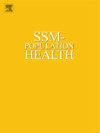Minority-owned small businesses and employer-sponsored health insurance
IF 3.1
2区 医学
Q1 PUBLIC, ENVIRONMENTAL & OCCUPATIONAL HEALTH
引用次数: 0
Abstract
Employer-sponsored health insurance (ESI) is a primary source of health coverage for working-aged adults in the U.S. Although most larger employers offer ESI, 46% of U.S. workers are employed by small businesses, which offer ESI at less than half the rate of large businesses. We extend prior research by examining detailed racial/ethnic ownership of small businesses and trends in offering ESI throughout the rollout of the Affordable Care Act's (ACA) small business policies. We use restricted data from the Census Bureau's 2012 Survey of Business Owners and the 2014–2016 waves of the Annual Survey of Entrepreneurs. Binary logistic regression allows us to examine whether the racial/ethnic composition of the business owners is associated with offering ESI, within each of the four waves of data. Finally, we plot the fitted percentage of small businesses that offer ESI across time and racial/ethnic ownership status, while adjusting for owner and firm characteristics. The majority of small businesses do not offer ESI. Further, disparities are substantial. In 2012, just 41% of White-owned small businesses offer ESI, compared to 26% of Black-, 26% of Asian-, and 23% of Hispanic-owned small businesses. These disparities fail to improve across years when the ACA incentives were implemented. Policies that recognize and address differences in ESI among small businesses, especially among Black-, Asian-, and Hispanic-owned small businesses, could strengthen healthcare systems and access to care in communities where minority-owned small businesses and their employees are located.
少数族裔拥有的小企业和雇主赞助的医疗保险
雇主赞助的健康保险(ESI)是美国工作年龄成年人健康保险的主要来源。尽管大多数大雇主都提供ESI,但46%的美国工人受雇于小企业,而小企业提供ESI的比例不到大企业的一半。我们通过详细研究小企业的种族/民族所有权以及在《平价医疗法案》(ACA)小企业政策推出过程中提供ESI的趋势,扩展了先前的研究。我们使用了来自人口普查局2012年企业主调查和2014-2016年企业家年度调查的有限数据。二元逻辑回归使我们能够在四波数据中的每一波中检查企业主的种族/民族构成是否与提供ESI相关。最后,我们绘制了跨时间和种族/民族所有权状态提供ESI的小企业的拟合百分比,同时对所有者和公司特征进行了调整。大多数小企业不提供ESI。此外,差距很大。2012年,白人拥有的小企业中只有41%提供ESI服务,而黑人、亚洲人和西班牙裔拥有的小企业中这一比例分别为26%、26%和23%。这些差距在ACA激励措施实施后的几年里都没有改善。认识到并解决小型企业(尤其是黑人、亚洲人和西班牙裔拥有的小型企业)ESI差异的政策,可以加强少数族裔拥有的小型企业及其员工所在社区的医疗保健系统和获得医疗服务的机会。
本文章由计算机程序翻译,如有差异,请以英文原文为准。
求助全文
约1分钟内获得全文
求助全文
来源期刊

Ssm-Population Health
PUBLIC, ENVIRONMENTAL & OCCUPATIONAL HEALTH-
CiteScore
6.50
自引率
2.10%
发文量
298
审稿时长
101 days
期刊介绍:
SSM - Population Health. The new online only, open access, peer reviewed journal in all areas relating Social Science research to population health. SSM - Population Health shares the same Editors-in Chief and general approach to manuscripts as its sister journal, Social Science & Medicine. The journal takes a broad approach to the field especially welcoming interdisciplinary papers from across the Social Sciences and allied areas. SSM - Population Health offers an alternative outlet for work which might not be considered, or is classed as ''out of scope'' elsewhere, and prioritizes fast peer review and publication to the benefit of authors and readers. The journal welcomes all types of paper from traditional primary research articles, replication studies, short communications, methodological studies, instrument validation, opinion pieces, literature reviews, etc. SSM - Population Health also offers the opportunity to publish special issues or sections to reflect current interest and research in topical or developing areas. The journal fully supports authors wanting to present their research in an innovative fashion though the use of multimedia formats.
 求助内容:
求助内容: 应助结果提醒方式:
应助结果提醒方式:


